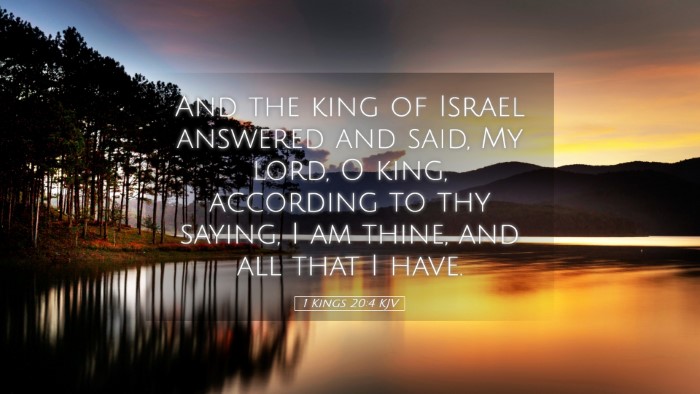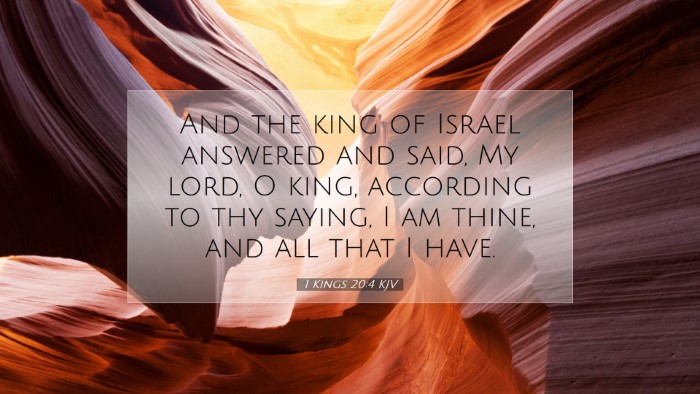Commentary on 1 Kings 20:4
Verse: 1 Kings 20:4 - "And the king of Israel answered and said, Tell him, Let not him that girdeth on his harness boast himself as he that putteth it off."
Context and Historical Background
This verse falls within a larger narrative describing the conflicts between Israel and Syria, specifically during the reign of King Ahab. The backdrop of this conflict is significant as it showcases the political and military tensions of the time. The Syrian king Ben-Hadad sent messengers to Ahab, threatening him and demanding tribute. Ahab's response reflects both his strategic thinking and bravado.
Matthew Henry emphasizes the context that Ahab, who had previously exhibited both faith and fear, here showcases a certain mock bravado, subtly indicating the folly of one who boasts while the battle is still to be fought.
Interpretation of the Verse
The essence of Ahab's response can be distilled into a cautionary principle regarding pride and self-confidence in the midst of uncertainty and conflict. The phrase "Let not him that girdeth on his harness boast himself as he that putteth it off" serves as a proverbial warning against premature celebrations or overconfidence.
- Self-Confidence vs. Reality: Ahab illustrates the human tendency to overestimate one's strength before a battle.
- Military Readiness: The harness symbolizes preparation for battle, suggesting a call to understand the seriousness of the conflict.
- Folly of Boasting: This caution against arrogance is a timeless teaching relevant for both leaders and individuals facing challenges.
Theological Insights
This verse invites theological reflection on pride and humility. Albert Barnes notes that this response can serve as a mirror for Israel's spiritual condition. Just as Ahab confronts an external enemy, so too must believers confront the internal battle against pride.
Trust in God: While Ahab's comment reflects a sense of bravado, true strength is found in dependence on God. This perspective is echoed in the entirety of Scripture where reliance on divine strength is exalted over human effort.
Practical Applications
The principle found within 1 Kings 20:4 can be applied in a variety of contexts, from pastoral leadership to personal spiritual growth. Here are several applications:
- Leadership Lessons: Leaders ought to be cautious about boasting of their plans and strategies, especially in turbulent times.
- Spiritual Vigilance: Just as military leaders must prepare for confrontation, Christians are called to be vigilant against sin and temptation.
- Community Discourse: In communal settings, humility must be prioritized, allowing for a culture where people uplift one another rather than compete.
Conclusion
1 Kings 20:4 serves as a reminder of the need for humility and reliance on God in the face of trials. The insights from Matthew Henry, Albert Barnes, and Adam Clarke enrich our understanding of this text, urging both an awareness of our limitations and a faithful trust in divine provision.
As preachers, scholars, and students of the Word reflect on this verse, let us keep in mind the balance of preparation and humility, never forgetting that boasting in our own strength is folly, while boasting in the strength of the Lord leads to true victory.


